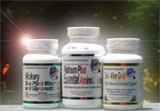Liver
Dr. Brice E. Vickery
©2007 SuperNutrient Corporation
The liver is the largest organ in your body and one of the most important. Two of the liver’s most vital functions are removing toxins from the blood (and preparing them to safely exit the body), and manufacturing important blood proteins such as albumin.
The blood detoxification process is a two–phase operation in which the blood is filtered and toxins are broken down and prepared for removal from the body. This operation is known as the Phase I and Phase II detoxification pathways. In the space of a single minute a healthy liver filters and detoxifies 99% of waste material from two quarts of blood. Because the enzyme pathways of a sick or damaged liver will be unable to effectively break down and clear the body of this amount, toxins and poisonous material will end up in the blood or stored in body tissues.
The blood enters the liver and passes through a special filtration system located between the hepatocytes known as the sinusoids. The sinusoids remove waste products and toxins from the blood. Special cells located in these sinusoids (Kupffer cells) break down the toxins in a process known as Phase I detoxification. This process involves cytochrome P450 enzymes, which break down the toxins into smaller particles. This process of chemical oxidation creates large amounts of free radicals, which must be neutralized by adequate intake of ascorbic acid. In fact, safe and effective Phase I detoxification involves adequate amounts of both Vitamin C and all the B vitamins.
Once the blood has been filtered and passes through Phase I it is then ready for the Phase II detoxification pathway. During this phase the reduced toxins are bound to glutathione, glycine and sulfur, making them harmless, water soluble, and ready to pass out of the body in the form of bile or urine. The necessary support nutrients for this pathway are the sulfur–containing amino acids, vitamin E, and vitamin A.
If the body has an insufficient amount of amino acids available for the creation of Phase I enzymes, the toxins will not be sufficiently broken down for Phase II and complete detoxification will not occur. If there are not enough amino acids for the creation of glutathione or if there is not enough sulfur in the body, Phase II will not be effective in neutralizing the toxins. When Phase I and II detoxification do not work effectively, toxins build up in the body, overworking the immune system. The body begins to present symptoms such as rashes, sinusitis, aching joints, dry skin, arthritis, constipation, fatigue, etc.
Another important function of the liver is the manufacture of various different blood proteins, such as albumin. Adequate amounts of albumin in the blood ensure that the body will retain a proper blood/tissue fluid balance. Albumin soaks up excess fluid from the surrounding tissues and keeps them in the blood. If there are not enough amino acids available for the liver to manufacture a sufficient amount of albumin, the body tissues will start to retain fluid and signs of edema will occur.
Albumin is also a major component of the transport system. The transport system is comprised of systemic proteins that carry nutrients into the cell. The albumin–containing proteins carry tryptophan, fatty acids, bilirubin, calcium, hormones, and many other substances.
It doesn’t matter how many vitamins or minerals you take, without these transport proteins, nutrients cannot enter the cells. If the liver doesn’t have enough amino acids available to make a good supply of albumin, we will be transport protein deficient.
Molybdenum is one of the nutrients required for the manufacture of several of the Phase 1 detoxification enzymes such as aldehyde dehydrogenase and aldehyde oxidase. These two enzymes neutralize acetaldehyde, a metabolic byproduct of yeast, fungi, and alcohol. Candida patients are often overloaded with this neurotoxin, which accumulates in the blood liver, organs, tissues and intestines, putting their immune system under large amounts of stress. Molybdenum is also involved in the manufacture of certain Phase 1 enzymes that oxidize the sulfites in preservatives, and neutralize the toxins involved in protein metabolism. Molydenum is also involved in flushing the excess copper from the system as well as preventing dental cavities when adequate amounts are stored in the tooth enamel. When the liver has enough molybdenum, detoxification becomes more complete and the immune system can do a better job at fighting off other infections.
Both of these processes (detoxification and blood protein manufacture) require adequate amounts of amino acids. In times of stress on the system such as illness, the amino acid requirements are even higher. If the digestive process is not producing the needed amounts of amino acids for the liver, these processes will be incomplete resulting in toxin overload in the tissues, malnutrition, edema, and slow wound healing. The liver and the immune system are the two largest manufacturing sites of systemic proteins in the body. If there are not adequate supplies of essential amino acids from dietary sources to build these systemic proteins, the body will begin to break down.
Platinum Plus Essential Amino Acids contains all the essential amino acids and extra molybdenum you need to help the liver manufacture Phase I detoxification enzymes and Phase II glutathione. It also has 800 mg. (per 4 capsule serving) of sulfur to help in Phase II detoxification. When you take Platinum Plus you will also ensure that the liver is getting the amino acids it needs to manufacture adequate blood proteins.




